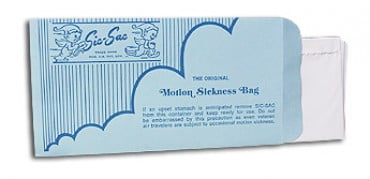Some students and even some veteran pilots experience air sickness from time to time. In fact for my first 10 hours of flight training (about 20 years ago now) I was sick during every lesson.
Eventually the sickness disappeared but I learnt a few things along the way. Below I have outlined a few of my tips:
Eat something before you fly
I am still amazed at how many new students have heard that it’s best not to eat anything before you fly or you might get sick. Nothing could be further from the truth. You need something in your stomach otherwise you are guaranteed to get sick. However that doesn’t mean you should go and fill up with a stack of pancakes and a chocolate milkshake. If you suffer air sickness keep your diet simple when flying.
Food to Avoid
- Anything with lots of sugar and anything with milk (so rule number one = avoid milk)
- If you are dieting, skip the protein shake and have some real food that day
- Avoid anything too greasy or oily
- Avoid soups – I have learnt this the hard way)
- Avoid salads with lots of lettuce or cabbage, this will give you gas and will not help matters.
Food you can eat
Here are some foods I have found work well for me:
- Bananas work very well. They fill you up with no yucky feeling
- Rye Bread (toasted is OK) with vegemite or something else light on the bread
- Ginger tablets – these work well for stopping nausea
Wear loose cotton clothing
Make sure your clothing is light and can breathe. If you get hot you are more likely to feel sick.
Have plenty of ventilation
Choose an aircraft that has plenty of air vents and plenty of ventilation. If idling for a long period at the holding point or while sitting and chatting to the instructor before the flight, have the canopy wide open
Drink plenty of water
This one is a important: you will get air sick if you’re dehydrated. So sip on pure water before you fly and take a bottle of water in the air to sip on.
Tell the instructor if you feel sick
It amuses me how some students would prefer to vomit all over the cockpit than to suffer the embarrassment of having to let the instructor know that feeling sick. I know know the tell-tale signs all too well: students become quieter, they start sweating, their face becomes pale and they don’t react very quickly.
It’s important to tell the instructor as soon as you feel a bit queasy. The instructor can then make things more comfortable for you, to try to avoid any impending projection.
Damien Wills, May 2015
To read more blogs by Damien, click here.

